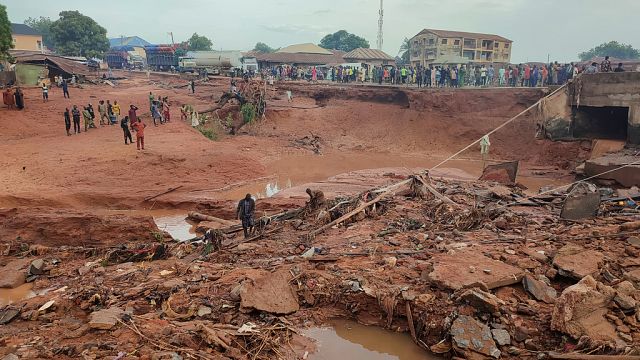Torrents of predawn rain unleashed a devastating flood in the market town of Mokwa, Nigeria, where at least 150 lives were tragically lost. Situated more than 180 miles west of Abuja, the town serves as a crucial hub where northern farmers trade their produce with southern merchants. The Nigerian Hydrological Services Agency has yet to quantify the rainfall that inundated Mokwa after midnight on Thursday, but officials fear the death toll may rise in the coming days.
Northern Nigeria has been grappling with prolonged dry spells exacerbated by climate change, leading to erratic and excessive rainfall during the short wet season. This unpredictable weather pattern has resulted in severe flooding, leaving communities vulnerable to nature’s wrath. Videos and images circulating on social media depict submerged homes and neighborhoods engulfed by brown currents, with rooftops barely visible above the water. In the midst of this disaster, residents wade through waist-deep water, salvaging what little they can and assisting others in need.
Mokwa, a bustling town nearly 380 kilometers west of the capital, Abuja, serves as a critical junction where southern traders purchase essential commodities like beans and onions from northern farmers. Alhaji Aliki Musa, a respected community leader in Mokwa, describes the floods as a seasonal occurrence, yet he notes the current deluge is unprecedented. “The water is like spiritual water which used to come but it’s seasonal…there’s not much water in Mokwa that will bring that flood,” he laments.
This recent catastrophe adds to a series of natural disasters that have plagued Nigeria in recent years. In September, Maiduguri in northeastern Nigeria witnessed torrential rains and a dam collapse, resulting in severe flooding that claimed the lives of at least 30 individuals and displaced millions. This catastrophe compounded the existing humanitarian crisis in the region, which has long been suffering from the atrocities of Boko Haram, a militant group operating in northeastern Nigeria.
The recurring floods in Nigeria underscore the urgent need for proactive measures to mitigate the impact of climate change and strengthen the country’s resilience to natural disasters. As extreme weather events become more frequent and severe, communities must prioritize disaster preparedness and sustainable development practices to safeguard lives and livelihoods. The government, in collaboration with local authorities and international partners, must work towards implementing robust strategies to address the root causes of flooding and ensure timely response and recovery efforts.
As Nigeria mourns the lives lost in this tragic flood, it serves as a stark reminder of the interconnectedness of climate change, environmental degradation, and human vulnerability. The devastating consequences of natural disasters demand collective action and a concerted effort to build a more resilient and sustainable future for all. The resilience and spirit of the Nigerian people in the face of adversity exemplify the strength and unity needed to overcome challenges and rebuild communities in the wake of such calamities.









Leave feedback about this